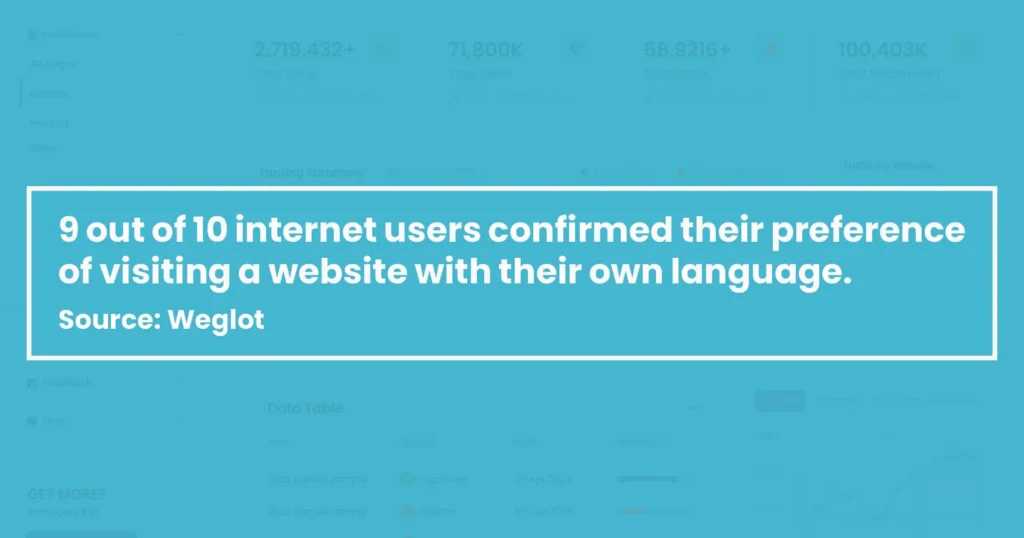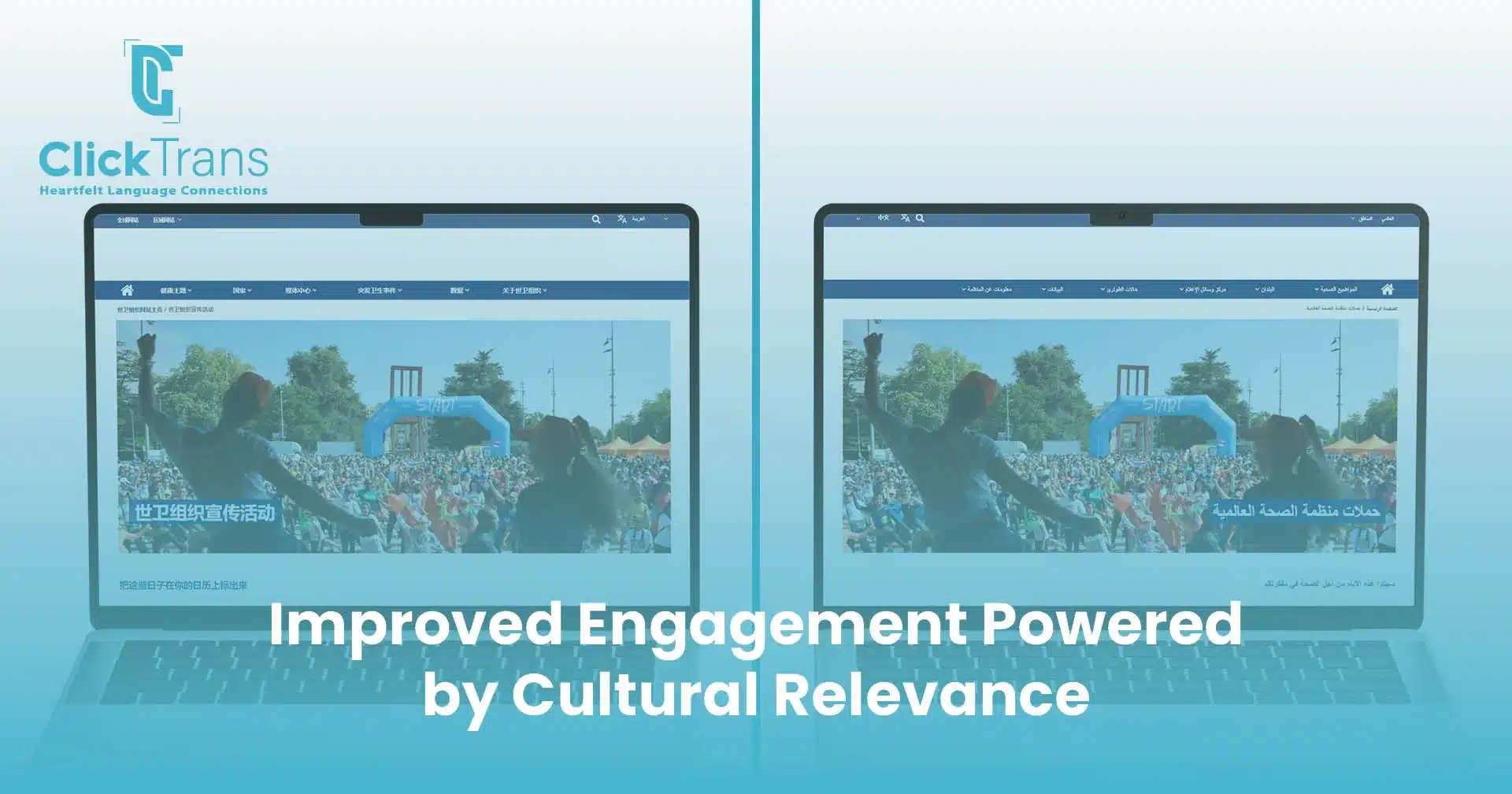Table of Contents
ToggleIntroduction
The digital landscape has evolved significantly. Now, if you are running business online, you can’t just assume that everyone understands English and expect them to interact with your content. You should do more to appeal to your audience globally if you seek success worldwide. That’s where you need website localization services.
In this article, we will shed light on professional website localization and tell you what you need to know to achieve your goals overseas.
What Is Website Localization?
Localization, derived from the Latin word “locus”, meaning “place”, entails making content feel native within the context of a certain culture. Website localization is the process of transforming a website to meet specific audiences’ linguistic needs and resonate with their cultural tastes.
This transformation doesn’t stop at the level of translating texts word for word. It goes beyond language conversion to include imagery, currencies, layouts, and anything that makes a visitor’s experience more authentic.
The Difference between Translation and Localization
Understanding localization vs translation is critical when planning your international content strategy, given they are closely related terms. This sometimes results in using them interchangeably. However, they are two distinct terms, with each focusing on different approaches to content conversion.
Translation is when a translator’s main objective is to produce an equivalent text in a target language, paying close attention to delivering the meaning inherent in the source text. The primary focus here is to have two texts in two different languages, with both maintaining the core message.
Localization, on the other hand, targets cultural immersion. While translation is an essential part of localization, here, however, a translator’s job is also to mind cultural-specific terminology, imagery (if any is provided in the source content), date formats, and more.
Business Benefits of Website Localization Services

Investing in website localization services isn’t just about appealing to your audience with no tangible benefits. It is a strategic investment that yields several business benefits, which can be reflected in your brand’s financial growth. Here are some examples:
- Expanded Market Reach
There is no doubt that if your content is available in multiple languages, more people will be willing to engage with it. Based on a study conducted by CSA Research in a series called “Can’t Read, Won’t Buy”, they found that 76% of online shoppers prefer to buy products with information in their native language, which highlights the critical need for website localization services.
- Enhanced Customer Experience and Trust
According to Weglot, 9 out of 10 internet users confirmed their preference of visiting a website in their own language. Why? Because this way they trust that they will not miss out on any information available on the website, due to facilitated comprehension. By making sure to enhance UX, you strengthen the bond you have with your customers and secure a long-term relationship with them.
- Improved Search Engine Visibility
Doing business online is highly dependent on visibility and traffic. However, this traffic needs to be organic so that search engines can recognize them as relevant. Optimizing your website with local keywords ensures your website appears naturally in your target market’s language, substantially increasing your visibility.
Key Steps in the Website Localization Process
Website localization can seem at first glance as hectic and time-consuming, with no clear wins. However, a systematic approach should make the task much easier and lead to materialized benefits. Here are some key steps to consider if you want to embark on website localization:
- Laying out the foundation by defining your target markets, languages, cultures, and the potential of your endeavor’s success. You should also find a suitable website localization service provider, whose job is to
streamlines your localization process.
- Content extraction should be your next step once you gather the previous information. Here, you extract all the translatable material, ensure your website’s code and design are ready for localization, and develop a style guide and glossary to facilitate the process.
Cultural adaptation, or simply localization, is the core phase here. This is where native-speaking professional linguists put their expertise to the test by adapting all the details to meet your target audience’s needs. This includes keywords, imagery, layouts, and much more — often supported by advanced website localization tools to ensure consistency and efficiency across all localized content
- Integration with CMS is your next priority by reviewing the website’s layouts, designs, videos, and whatnot for each localized version.
- Quality Assurance is without doubt integral since it adds an extra layer of excellence that prepares your website for a seamless launch.
- Deployment and monitoring represent the final step. This is where your website goes live, so you should keep an eye on its performance and iron out any wrinkles that might have slipped to ensure optimal performance.
Real-World Examples of Successful Website Localization

This is where we walk the talk. Theoretically speaking, localization is a fantastic idea. However, you might be asking yourself, “What guarantees do I have that it’s worth the effort?”
This is why we prepared a real-world example of website localization done by the book.
Before Netflix came around, Disney used to be a prime example of localization done right. Now that they own their private streaming service, they have taken their experience with localization to the next level.
If you are a Disney+ user, you will be able to enjoy a variety of localization features including different languages for audio and subtitles, not to mention the fully localized menus and UI as well.
Depending on the country or region you are logging in from, you will find that the price tags for their plans are adjusted based on country-specific currencies to spare you the effort of converting the currency relying on an outside source.
Such an approach makes a user’s experience feel more intuitive and native and ensures greater benefits for you as a business owner.
Get Professional Website Localization Services from ClickTrans
If you are not sure about whom to rely on for your next website localization project, don’t worry because ClickTrans is here for you.
ClickTrans offers you a passionate team of highly trained linguists, whose sole purpose is bridging the gaps between global communities through precision and creativity.
Our brand’s commitment to excellence guarantees a holistic approach to website localization solutions and offers strategic planning on a large scale. From human translations, transcreation, and SEO localization to rigorous quality assurance, we promise accurate translation and localization in any language you demand.
Our teams have in-depth technical expertise that show unmatched understanding of CMS integration, hreflang implementation, and optimization for local search engines to ensure your site runs flawlessly in any target language.
Frequently Asked Questions (FAQs)
Q1: What are hreflang tags?
A: Hreflang tags are code pointers that inform search engines which language and region your page is targeting. They play an essential role in multilingual SEO since they help your localized pages achieve higher ranks on search engines like Google and Baidu.
Q2: Is website localization a costly process?
A: The word “costly” can vary in meaning depending on your needs and your allocated budget specifically. Nonetheless, from a business standpoint, website localization services remain a wise investment for the abundance of values they offer in return.
Q3: What challenges to expect when approaching website localization?
A: Website localization challenges include cultural sensitivity, technical complexities, and maintaining consistent quality across different languages. However, if you have a clear plan from the start, many of those challenges should pass by without friction.
Q4: Do I need to localize all the content on my website?
A: That depends on your priorities. Starting with key material should be the ideal approach. This way you will test the benefits of localization firsthand and expand your business over time based on market response.
Conclusion
Nowadays, running business online demands more from business owners if they ever aspire to achieve global dominance and this is exactly what website localization offers.
By customizing their website content to address global communities’ cultural needs, business owners ensure that their message will get through any language barrier, no questions asked.
Still looking for a website localization service? Click here and get a free quote now!







